Imagine how much your faith would grow if you understood the Book of Romans better. How great would it be to have a resource that made Paul’s letter easy to understand without abandoning its depth? Perhaps it’s time to take your study of Romans to the next level. Bible commentaries on Romans can help you do this.
The Bible instructs Christians to seek wisdom (Prov. 1:7, James 1:5), and who better to learn from than pastors, theologians, and professors who have been studying and teaching Romans for decades?
10 Best Romans Commentaries
The best Romans commentaries are listed below. The recommendations include commentaries for every reading level and purpose, including individual Bible study, small groups, Sunday school, preaching, and teaching. The “Top 10” list is based on aggregate reviews.
Readers are encouraged not to use commentaries to replace prayer, the Holy Spirit, and the individual’s diligent study of Scripture. Nevertheless, a list based on aggregate reviews will likely point you in the right direction to find the right resource for your purposes.
Please use the list below as a starting point for learning about commentaries on Matthew. It’s not intended as the “final word” on the topic but merely a “helpful word.”
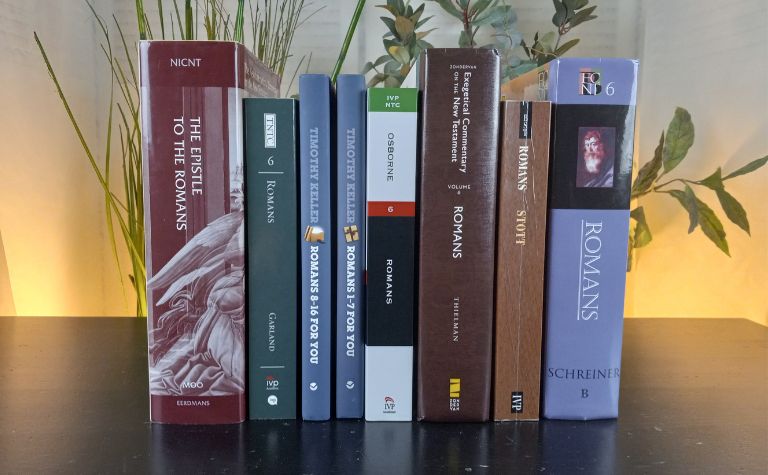
1. The Epistle to the Romans by Douglas Moo (NICNT)
Douglas Moo is a prominent biblical scholar and theologian. He is known for his conservative approach to biblical interpretation and is highly regarded within the evangelical community.
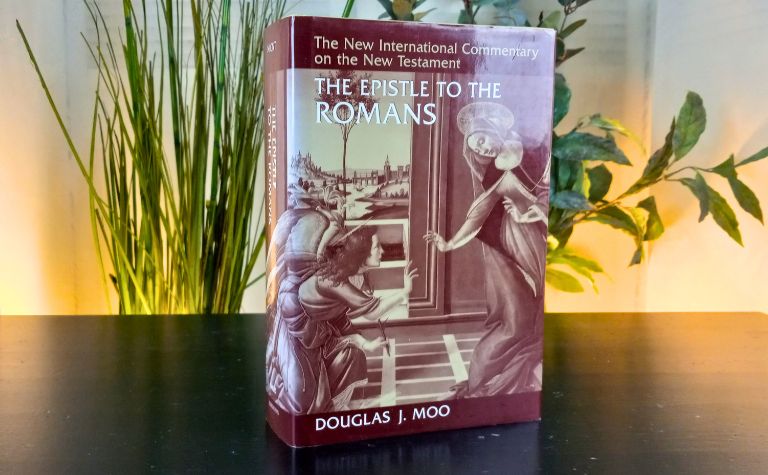
Moo’s commentary is theologically conservative
Having been in publication for approximately 25 years now, it is not a reach to say that Moo’s Romans commentary in the NICNT series is the top choice for pastors based on accumulated reviews.
One academic journal says, “This is a monumental work that can be placed among the best commentaries on Romans. If one wants to know the content of Romans, this commentary needs to be consulted. This work will be helpful to teachers, pastors, and students of God’s Word” (Biblioteca Sacra).
D.A. Carson calls it “the best Romans commentary for pastors available in English.” Keith Mathison of Ligonier Ministries ranks it #1, saying, “in terms of intermediate-advanced level commentaries, this one is the best place to begin.”
Moo’s commentary was published in 1996 and revised in 2018. It replaced John Murray’s Romans commentary in the NICNT series (see below).
This is an advanced, mid-level commentary (i.e., not introductory). Those who aren’t academics or pastors may want to consider Moo’s Romans volume in the NIVAC series, which focuses on application (see below).
The New International Commentary on the New Testament (NICNT) is a renowned series of commentaries that provides an in-depth analysis and interpretation of the books of the New Testament. It is widely regarded as a valuable resource for scholars, pastors, and students of the Bible.
Please also see Best Commentary Series: The Top 50 based on aggregate reviews.
2. Romans by Thomas Schreiner (BECNT)
Thomas R. Schreiner is a well-known biblical scholar and theologian. He specializes in New Testament studies and has significantly contributed to the field. Schreiner is widely recognized for his expertise in Pauline theology.

Many pastors find Schreiner’s commentary helpful
Carson and Desiring God ministries (John Piper) place Schreiner’s volume in the top-tier of Romans commentaries. It’s well-reviewed for its exegesis and interpretation of the epistle.
Schreiner is known for his expertise in Pauline theology, particularly in the areas of justification, the role of law in Paul’s writings, and the doctrine of salvation. He argues against The New Perspective on Paul.
This is a mid-level commentary. It’s ideal for pastors with some knowledge of Greek, though it’s not technical.
The Baker Exegetical Commentary on the New Testament (BECNT) is a series of commentaries that provides detailed, scholarly analysis and interpretation of the books of the New Testament. It’s known for its commitment to thorough exegesis, theological reflection, and reputable authors.
Also, see the Best One-Volume Bible Commentaries based on aggregate reviews.
3. Romans by Frank Thielman (ZECNT)
Frank Thielman is a distinguished biblical scholar and theologian known for his contributions to the field of New Testament studies. His expertise lies in the study of the Pauline epistles and the theology of the New Testament.

Thielman combines exegesis, theology, and application
Thielman’s commentary is praised for its thorough exegesis of the text. He carefully examines the flow of argument, the meaning of individual verses, and the book’s structure. His analysis of key theological concepts, such as justification, faith, and the role of the Law, is highly regarded.
While this volume is academically rigorous, he also provides practical application for the text. He shows how the theological truths of Romans can be applied to the life of believers. This pastoral emphasis makes Thielman’s commentary helpful for individuals seeking to live out the teachings of Romans.
The Zondervan Exegetical Commentary on the New Testament (ZECNT) series aims to provide an in-depth analysis of the New Testament books while maintaining accessibility for pastors, scholars, and general readers.
4. The Epistle to the Romans by John Murray (Stand Alone)
John Murray (1898-1975) was a prominent Reformed theologian and biblical scholar known for his contributions to systematic theology and biblical studies. He was deeply influenced by the Reformed tradition, particularly the theology of John Calvin.

Murray was a devout Calvinist
Murray’s commentary on Romans is known for its thorough examination of the letter. He delves into the original Greek language, examines the historical and cultural context, and provides detailed explanations of key theological concepts.
Murray presents his ideas in a logical and organized way, making it easier for readers to follow his arguments. This clarity of exposition is appreciated by both pastors and laypeople looking to engage with the text.
Murray’s commentary on Romans is influenced by Reformed theology, which emphasizes the sovereignty of God, the doctrines of grace, and the centrality of Christ. This volume is considered a classic in Reformed circles.
Initially part of NICNT, it has since been replaced by Moo’s commentary above. Because of its popularity, Murray’s Romans volume continues to be published as a stand-alone volume.
5. The Message of Romans by John Stott (BST)
John Stott (1921-2011) was a highly influential British evangelical leader, theologian, and biblical scholar. He profoundly impacted global Christianity, attributed to his preaching and writing.

A dream commentary on Romans for preachers
Stott was renowned for his pastoral heart and ability to communicate biblical truths in a practical and accessible manner. His commentary on Romans reflects this pastoral emphasis, providing relevant and applicable insights for believers today.
His writing style is clear, engaging, and easy to understand. Stott straightforwardly communicates complex ideas, making his commentary accessible to a broad range of readers, including pastors, Bible study groups, and individual readers.
The BST series maintains a commitment to the authority and inspiration of the Bible. It focuses on applying the biblical text to contemporary life and addressing its relevance to the reader’s faith and Christian living.
6. The Epistle to the Romans by Leon Morris (PNTC)
Leon Morris (1914-2006) was a highly respected Australian biblical scholar and theologian. He made significant contributions to the field of New Testament studies, particularly in the areas of the Gospels and the Apostle Paul’s writings.
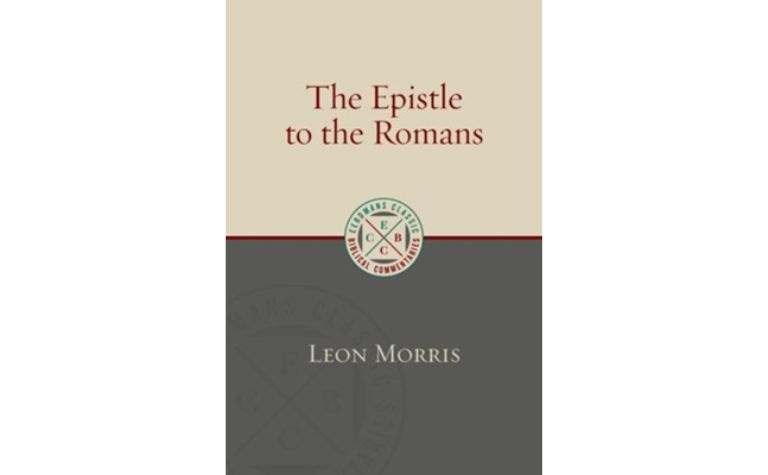
Morris was Reformed
Mathison recommends Morris’ Romans commentary, saying it’s one of the best of the epistle. Carson remarks, “its strength is the seriousness with which it takes the text.” Published in 1988, Kruse’s commentary replaced this one in the series in 2012 (see below).
Morris’ commentary reflects his deep engagement with the text, drawing upon his expertise in Greek language, historical context, and literary analysis. Many readers appreciate his careful attention to detail and the thoroughness of his research.
Morris situates the Book of Romans within its historical and theological context. He draws on his knowledge of Jewish and Greco-Roman culture to shed light on the background and context of Paul’s letter.
The publisher notes that the Pillar New Testament Commentary (PNTC) series combines “rigorous exegesis and exposition, with an eye alert both to biblical theology and the contemporary relevance of the Bible.”
7. Romans by Colin G. Kruse (PNTC)
Colin G. Kruse is a respected biblical scholar and theologian. He specializes in the study of the New Testament and has made significant contributions to the field.
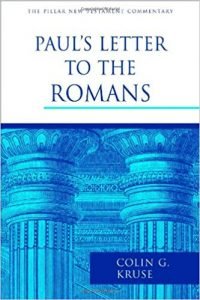
Kruse is conservative with a high view of Scripture
Kruse’s commentary is highly regarded for its scholarly excellence. Carson writes, “Kruse writes with clarity, verve, and good judgment, making this work another favorite for pastors.”
He engages with the original Greek text and provides careful exegesis of the book. His analysis incorporates linguistic and grammatical insights, historical context, and literary structure.
Kruse explores the practical implications of Paul’s teachings for Christian living, providing insights and applications that resonate with readers. This pastoral emphasis helps readers bridge the gap between theological understanding, personal faith, and discipleship.
8. Romans by Richard N. Longenecker (NIGTC)
Richard N. Longenecker is a prominent American biblical scholar and theologian. He has made significant contributions to New Testament studies, particularly in the Pauline epistles and the book of Acts.

A Romans commentary for those who know Greek
Longenecker engages with the Greek text of Romans and provides thorough exegesis, incorporating linguistic, grammatical, and syntactical analysis. His commentary is known for its careful attention to detail and engagement with the broader scholarly conversation on Romans.
Longenecker delves into the theological richness of Romans, providing thoughtful reflections and interpretations of key theological concepts.
He explores the overall structure of the book, as well as the flow of Paul’s arguments, identifying key themes and theological concepts.
The New International Greek Testament Commentary series is highly regarded among biblical scholars and theologians for its commitment to scholarly excellence and its focus on providing in-depth exegesis of the Greek text.
9. Romans (2 vol.) by James D.G. Dunn (WBC)
James Dunn is a highly regarded British New Testament scholar and theologian. He has made significant contributions to biblical studies, particularly in the areas of Pauline theology and the study of early Christianity.
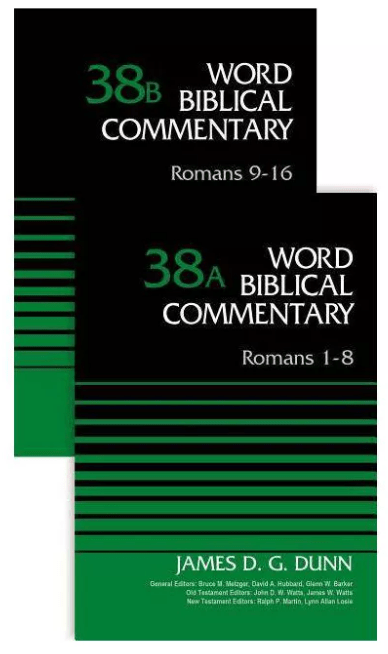
Dunn advocates for the New Perspective on Paul
Dunn’s commentary reflects his extensive knowledge and expertise in the subject matter. Readers appreciate his thorough engagement with the text, incorporating linguistic analysis, historical context, and theological insights.
Dunn is associated with the Church of Scotland and Methodism. This commentary is known, in part, for Dunn’s advocacy of The New Perspective on Paul. This distinguishes this volume from many others on this list.
The publisher notes that the WBC series “delivers the best in biblical scholarship from the leading scholars who share a commitment to Scripture as divine revelation.”
10. The Epistle to the Romans (2 vol.) by C.E.B. Cranfield (ICC)
C.E.B. Cranfield (1915-2015) was a prominent British biblical scholar and theologian. He specialized in New Testament studies, particularly the study of the Pauline epistles.

Cranfield’s commentary is technical
Bible scholar Thomas Schreiner calls Cranfield’s commentary “technical but outstanding.” Mathison says it’s “one of the most thorough commentaries on this book.” Carson suggests it “provides students with an education in grammatical exegesis.”
The green two-volume hardback edition of this commentary is technical and among the most expensive books on this list. The pink two-volume paperback edition is the abridged version and is not technical. However, even in paperback, they are still among the most costly volumes on this list.
The publisher notes that the ICC series combines “all the relevant aids to exegesis, linguistic and textual no less than archaeological, historical, literary and theological to help the reader understand the meaning of the books of the Old and New Testaments.”
10 More Commentaries on the Gospel of Romans
Why are the Romans commentaries below not in the “Top 10”? It’s not because they have received poor reviews or people haven’t found them helpful. The reasons vary.
Some are relatively new and haven’t been widely reviewed, read, or used. Others haven’t been broadly distributed, so getting enough information to aggregate is difficult. And others may be outdated in relation to biblical scholarship or out of print and difficult to acquire.
The “Top 10” list is reviewed annually. Readers are encouraged to consider the volumes in this section before purchasing a Romans commentary. These ten are not in any particular order.
Romans (2 vol.) by Timothy Keller (GWFY)
Tim Keller (1950-2023) was a prominent Christian minister, author, and theologian. He is best known as the founding pastor of Redeemer Presbyterian Church in New York City, which he led for nearly three decades.

Pastor-friendly introductory commentary
In his Romans commentary, Keller thoroughly explores the key theological themes and doctrines found in the book. Many readers appreciate his fidelity to biblical truth and his ability to present complex concepts clearly and coherently.
Keller’s background as a pastor shines through in his commentary. He brings a pastoral perspective to his exegesis of Romans, emphasizing the application of the text to everyday life. This practical orientation resonates with readers seeking to understand how the truths of Romans can shape their faith and actions.
Keller is renowned for his ability to engage with contemporary culture while staying true to biblical principles. In his commentary, he addresses relevant issues and challenges faced by Christians in today’s world.
Romans by Grant Osborne (IVPNTC)
Grant R. Osborne (1942-2018) is a prominent Bible scholar. He was known for his expertise in the New Testament and served as a professor of New Testament at Trinity Evangelical Divinity School (TEDS) for many years.
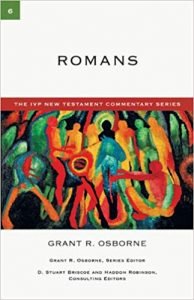
Osborne was Arminian
Osborne is recognized as a respected scholar in New Testament studies. His commentary on Romans reflects his extensive research and knowledge of the text.
Readers appreciate his careful examination of the book’s historical, cultural, and linguistic aspects, providing a solid foundation for understanding Romans.
Osborne also wrote the Matthew commentary in the ZECNT series, which is considered one of the best Matthew commentaries.
The publisher notes that each volume in the IVPNTC series is “informed by the best of up-to-date evangelical scholarship, presents passage-by-passage commentary based on the NIV along with background information on authorship, setting, theme, and various interpretive issues.”
Romans by Douglas Moo (NIVAC)
Moo (see #1 above) has significantly impacted biblical studies, particularly in the area of Pauline theology and the interpretation of the New Testament. His writings continue to be influential and widely studied by scholars and students of the Bible.
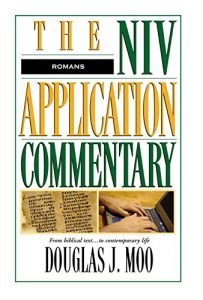
Moo’s NIVAC volume focuses on applying the text to life
See more about Moo’s commentary in the NICNT series (#1 above). The NIV Application Commentary series focuses on applying biblical texts to contemporary life. It seeks to bridge the gap between the ancient context of the Bible and its relevance to modern readers.
People appreciate this emphasis on practical application, as it helps them connect the timeless truths of Scripture to their daily lives. Each commentary in the series consists of three main components: the original meaning, bridging contexts, and contemporary significance.
Paul’s Letter to the Romans by Ben Witherington (SRC)
Ben Witherington is a prominent American biblical scholar and theologian. He has made significant contributions to New Testament studies and is known for his expertise in the life and teachings of Jesus, the Pauline epistles, and the book of Acts.
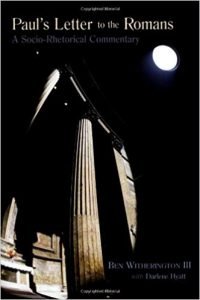
Witherington is Arminian
Witherington’s commentary on Romans is known for its comprehensive approach. He is Arminian. Witherington delves into various aspects of the text, including linguistic analysis, historical context, theological themes, and literary structure.
This commentary pays close attention to the historical and cultural context of Romans. He explores the social, political, and religious background of the time, shedding light on the original meaning and significance of the text. This contextual analysis helps readers grasp the nuances of Romans and its relevance to the first-century audience.
Romans by Michael Bird (SGBC)
Michael F. Bird is a prominent Australian biblical scholar and theologian. He has made significant contributions to the field of New Testament studies, particularly in the areas of Pauline theology, the Gospels, and the New Testament’s historical context.
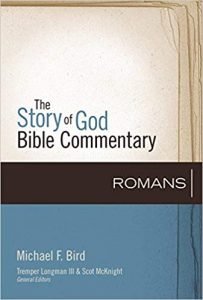
Pastor-friendly and Reformed
The Story of God Bible Commentary series focuses on the narrative arc and storytelling aspects of the biblical text. It seeks to uncover the overarching story of God’s redemptive work throughout Scripture.
While emphasizing the narrative, the commentary series also explores the theological dimensions of the biblical texts. It delves into the core theological themes and teachings present in each book, providing readers with a deeper understanding of the theological richness of Scripture.
The Story of God Bible Commentary series is known for its accessible and engaging writing style. The authors aim to present their ideas in a way that are understandable to a wide range of readers, including pastors, students, and laypeople.
Romans by Charles Hodge
Charles Hodge (1797-1878) was a highly influential American biblical scholar and theologian. He is best known for his work in systematic theology and his contributions to the development of Reformed theology in the United States.
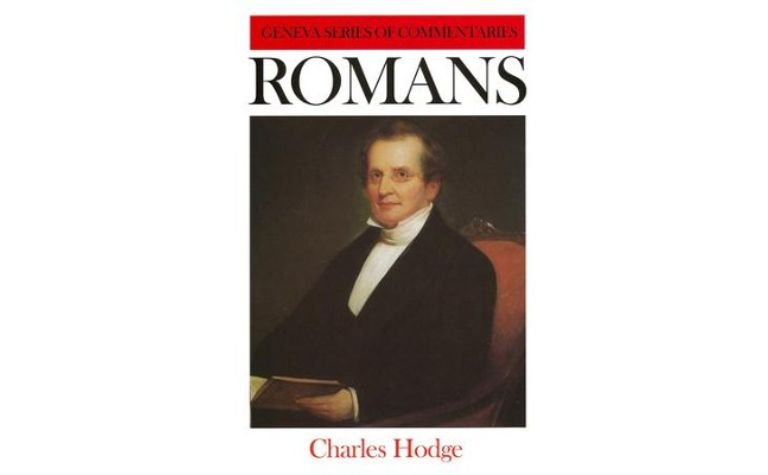
A Presbyterian classic
Mathison says Hodge’s commentary is “rich in exegetical and theological insight.” Readers who value doctrinal fidelity appreciate Hodge’s consistent engagement with key theological themes such as justification, faith, and the sovereignty of God.
Hodge’s commentary on Romans is praised for its comprehensive exegesis of the biblical text. He provides a detailed analysis of each passage, exploring the original meaning, grammar, and historical context.
Despite his reputation as a systematic theologian, Hodge brings a pastoral perspective to his commentary on Romans. He consistently seeks to apply the teachings of Romans to the practical concerns and challenges faced by believers.
Romans by F.F. Bruce (TNTC)
F.F. Bruce (1910-1990) was a highly regarded British biblical scholar and theologian. He is known for his significant contributions to the field of New Testament studies.
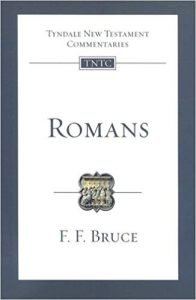
Considered a classic
His commentary on Romans reflects his meticulous research, deep understanding of the biblical text, and familiarity with the historical and cultural context.
Bruce delves into the historical and contextual background of Romans, providing valuable insights into the cultural and religious milieu of the time. His exploration of the historical setting of Romans helps readers grasp the text’s intended meaning.
Bruce is recognized for his commitment to the authority and inspiration of Scripture. His commentary on Romans reflects his reverence for the biblical text and his desire to faithfully understand and communicate its message.
Romans by James R. Edwards (NIBC/UBCS)
James R. Edwards is a respected American biblical scholar and theologian. He specializes in New Testament studies and has significantly contributed to the field.

Accessible and quotable
James R. Edwards is recognized for his meticulous scholarship, engagement with biblical texts, and contributions to the New Testament studies field. His works are widely read and appreciated by scholars, pastors, and students seeking in-depth exploration of the biblical texts he focuses on.
Edwards also wrote the Mark commentary in the Pillar series, which is considered one of the best Mark commentaries.
The publisher notes that volumes in the UBCS series break down “the barriers between the ancient and modern worlds so that the power and meaning of the biblical texts become transparent to contemporary readers.”
Romans by Robert Mounce (NAC)
Robert H. Mounce (1921-2019) was a prominent American biblical scholar and theologian. He made significant contributions to New Testament studies and biblical translation.
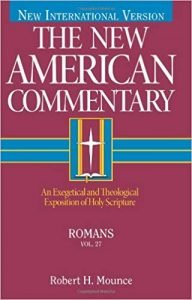
NAC reflects Baptist theology
Mounce brings a pastoral perspective to his commentary on Romans. He emphasizes the practical application of the biblical text, highlighting its relevance to the Christian life. Mounce is known for his Revelation commentary in the NICNT series, which is considered one of the best Revelation commentaries.
The publisher notes that the NAC series “has been designed primarily to enable pastors, teachers, and students to read the Bible with clarity and proclaim it with power.”
Paul’s Letter to the Romans: A Commentary by Peter Stuhlmacher (Stand Alone)
Peter Stuhlmacher (1932-2008) was a highly respected German biblical scholar and theologian. He made significant contributions to the field of New Testament studies, particularly in the areas of Pauline theology and the early Christian movement.
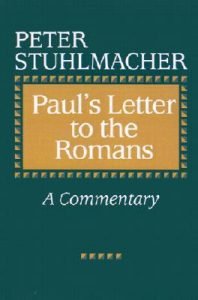
Brief, moderately critical treatment
Stuhlmacher is a respected biblical scholar with expertise in the New Testament and Pauline theology. His commentary reflects his thorough research and scholarly acumen.
Stuhlmacher engages with a wide range of scholarly perspectives on Romans. He presents different viewpoints and engages in critical dialogue with other scholars.
The publisher notes that “Stuhlmacher stresses the Old Testament and postbiblical Jewish traditions as the primary backdrop to Paul’s thought, as these traditions were known by Paul himself or mediated to him through Jesus and the early church.”
| Also see |
|---|
| See the Top 50 Bible Commentary Series |
| See the Top 25 Whole-Bible Commentaries |
| See the Study Bibles Comparison Chart (over 50) |
Related Questions
Whole Bible commentaries will help you understand every passage of Scripture better. If Bible commentaries on single books are like studying individual trees, whole-Bible commentaries will help you...
With so many Bible commentary series available today, many people want to know which ones are best. There is a wide variety of commentary series today because readers have various purposes for using...
